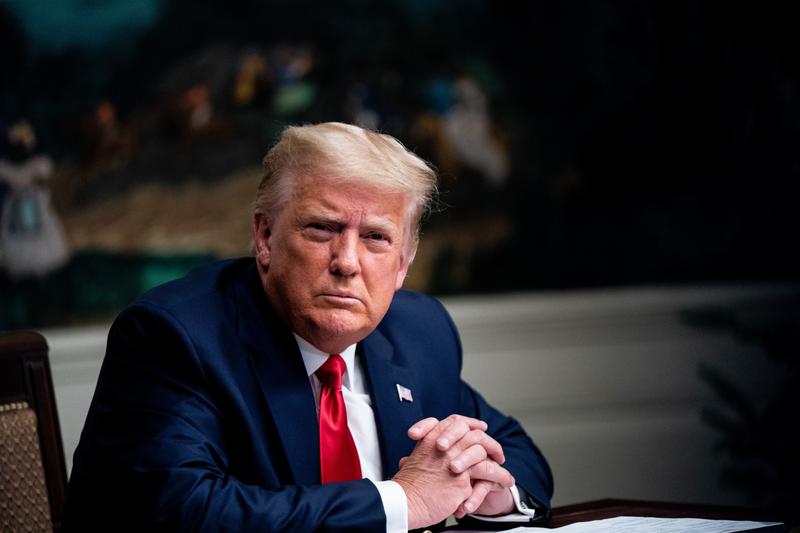 This undated photo shows former US president Donald Trump. (PHOTO / BLOOMBERG)
This undated photo shows former US president Donald Trump. (PHOTO / BLOOMBERG)
Donald Trump’s lawyers will mount a double-barreled defense of the former president in his impeachment trial next week, arguing that the process was rushed and partisan, and that his rhetoric to supporters who later stormed the US Capitol was constitutionally protected.
A person familiar with Trump’s still-evolving legal strategy said the defense would address head-on the allegation that Trump incited the violence at the Capitol on Jan 6, which left five people dead. Part of that strategy might involve reports and other evidence that some people in the mob had planned the attack ahead of time.
Trump’s unprecedented second Senate trial is set to begin next week, and Tuesday is the deadline for his newly reconstituted defense team to file his first response to the House of Representatives’ single article of impeachment
Trump’s unprecedented second Senate trial is set to begin next week, and Tuesday is the deadline for his newly reconstituted defense team to file his first response to the House of Representatives’ single article of impeachment accusing him of incitement of insurrection. If Trump or his lawyers fail to appear, Senate rules allow the body to proceed as if he had pleaded not guilty and try him without a defense.
The House impeachment managers, who will prosecute the case, are to file their legal briefs on Tuesday as well, providing the first look at their strategy for the trial. Trump’s legal briefs are supposed to be delivered next week, and the trial is set to begin Feb 9.
READ MORE: Impeachment: Democrats say Trump endangers security
With two-thirds of the Senate required to convict, at least 17 Republicans would have to vote with all 50 Democrats to find Trump guilty and potentially disqualify him from holding office again. In what amounted to a test vote, only five Republican senators voted with Democrats last week to block an effort to declare Trump’s impeachment trial unconstitutional.
Trump adviser Jason Miller said the defense team would meet Tuesday’s noon deadline, even though they have only taken up the case in recent days after Trump’s first set of lawyers resigned late last week. That legal team, led by South Carolina lawyer Butch Bowers parted ways with Trump over disagreements about whether to argue Trump’s debunked contention that the 2020 election was “stolen.”
Rehashing the election results would be a “breathtakingly bad decision” because while it appears there aren’t enough votes from Republican senators to convict right now, that could change, Jonathan Turley, a George Washington University law professor, said in an interview.
“This is where President Trump can snatch defeat out of the jaws of victory,” added Turley, who testified in Trump’s previous impeachment. “We’ve seen him go against legal advice and even logic on such occasions.”
The legal team will argue, according to a person familiar with the strategy, that Trump was constitutionally allowed to make his baseless claims about the election at his rally on the Ellipse south of the White House last month
The new team, headed by David Schoen of Atlanta and Bruce Castor of Philadelphia, will likely steer clear of those arguments.
“This is the political weaponization of the impeachment process. There was a rush to judgment,” Schoen said in an interview Monday night on Fox News.
The legal team will argue, according to a person familiar with the strategy, that Trump was constitutionally allowed to make his baseless claims about the election at his rally on the Ellipse south of the White House last month -- even if he used some incendiary rhetoric -- before the mob marched on the Capitol as Congress was officially certifying Electoral College votes, which Joe Biden won 306 to 232.
They’ll cite the Supreme Court’s landmark decision in Brandenburg v. Ohio, which involved a Ku Klux Klan leader’s prosecution under a state law for for making a speech that advocated violence against Blacks and Jews, according to the person familiar with the strategy. In that 1969 decision, the high court ruled speech advocating even illegal conduct is protected under the First Amendment unless that speech is likely to produce “imminent lawless action.”
Schoen told Fox News that impeaching Trump for his remarks to the crowd “is a very, very dangerous road to take with respect to the First Amendment.”
ALSO READ: Trump impeachment defense squeezed by team remake on trial eve
Schoen also said he expected House managers to show video of the riot -- which he doesn’t think the country needed to see -- and he questioned whether senators who have already called for Trump’s conviction can be impartial jurors. In a separate interview with the Atlanta Journal-Constitution, he suggested that Trump shouldn’t be blamed for the actions of the mob because, “There’s now evidence a lot of what happened was pre-planned.”
The defense will also argue that the House’s rushed its case, which included no formal fact-finding or committee hearings, and delayed presenting the article of impeachment to the Senate until Jan. 25, after Democrats took control of the chamber.
Another argument expected to be part of Trump’s defense is that trying a president who is now out of office is unconstitutional. It’s one that many GOP senators also have made, even though a sparse but consistent line of non-presidential impeachments in the past suggests the Senate does have legal authority to put Trump on trial even after his term has ended.
Turley, who spoke on a Republican caucus call last week right before most senators voted that trying a president no longer in office is unconstitutional, has argued that Trump’s best defense is not to put up one – to simply argue that the trial is unconstitutional and not legitimize it.


